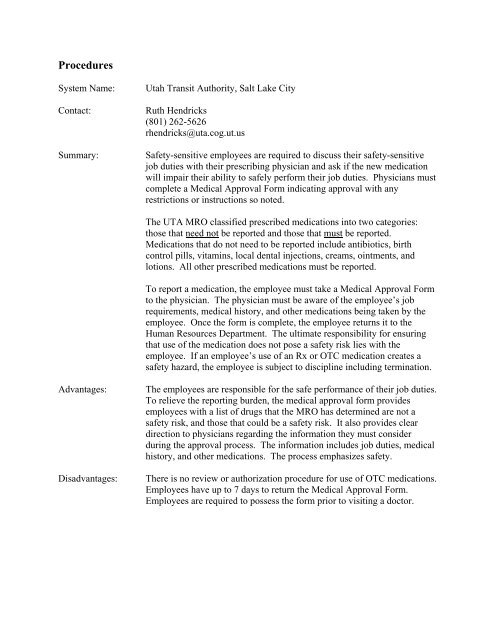Prescription and Over-the-Counter Medications Tool Kit ... - Home
Prescription and Over-the-Counter Medications Tool Kit ... - Home
Prescription and Over-the-Counter Medications Tool Kit ... - Home
Create successful ePaper yourself
Turn your PDF publications into a flip-book with our unique Google optimized e-Paper software.
Procedures<br />
System Name: Utah Transit Authority, Salt Lake City<br />
Contact: Ruth Hendricks<br />
(801) 262-5626<br />
rhendricks@uta.cog.ut.us<br />
Summary: Safety-sensitive employees are required to discuss <strong>the</strong>ir safety-sensitive<br />
job duties with <strong>the</strong>ir prescribing physician <strong>and</strong> ask if <strong>the</strong> new medication<br />
will impair <strong>the</strong>ir ability to safely perform <strong>the</strong>ir job duties. Physicians must<br />
complete a Medical Approval Form indicating approval with any<br />
restrictions or instructions so noted.<br />
The UTA MRO classified prescribed medications into two categories:<br />
those that need not be reported <strong>and</strong> those that must be reported.<br />
<strong>Medications</strong> that do not need to be reported include antibiotics, birth<br />
control pills, vitamins, local dental injections, creams, ointments, <strong>and</strong><br />
lotions. All o<strong>the</strong>r prescribed medications must be reported.<br />
To report a medication, <strong>the</strong> employee must take a Medical Approval Form<br />
to <strong>the</strong> physician. The physician must be aware of <strong>the</strong> employee’s job<br />
requirements, medical history, <strong>and</strong> o<strong>the</strong>r medications being taken by <strong>the</strong><br />
employee. Once <strong>the</strong> form is complete, <strong>the</strong> employee returns it to <strong>the</strong><br />
Human Resources Department. The ultimate responsibility for ensuring<br />
that use of <strong>the</strong> medication does not pose a safety risk lies with <strong>the</strong><br />
employee. If an employee’s use of an Rx or OTC medication creates a<br />
safety hazard, <strong>the</strong> employee is subject to discipline including termination.<br />
Advantages: The employees are responsible for <strong>the</strong> safe performance of <strong>the</strong>ir job duties.<br />
To relieve <strong>the</strong> reporting burden, <strong>the</strong> medical approval form provides<br />
employees with a list of drugs that <strong>the</strong> MRO has determined are not a<br />
safety risk, <strong>and</strong> those that could be a safety risk. It also provides clear<br />
direction to physicians regarding <strong>the</strong> information <strong>the</strong>y must consider<br />
during <strong>the</strong> approval process. The information includes job duties, medical<br />
history, <strong>and</strong> o<strong>the</strong>r medications. The process emphasizes safety.<br />
Disadvantages: There is no review or authorization procedure for use of OTC medications.<br />
Employees have up to 7 days to return <strong>the</strong> Medical Approval Form.<br />
Employees are required to possess <strong>the</strong> form prior to visiting a doctor.


